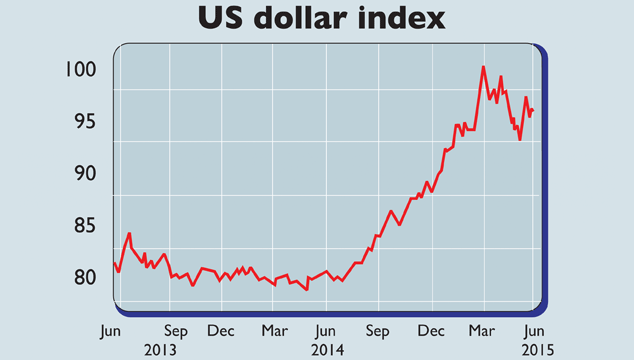US dollar: Greenback back on track
The US dollar index, which tracks the greenback’s progress against a basket of major trading partners’ currencies, hit a 12-year high in March before falling back.

Get the latest financial news, insights and expert analysis from our award-winning MoneyWeek team, to help you understand what really matters when it comes to your finances.
You are now subscribed
Your newsletter sign-up was successful
Want to add more newsletters?

Twice daily
MoneyWeek
Get the latest financial news, insights and expert analysis from our award-winning MoneyWeek team, to help you understand what really matters when it comes to your finances.

Four times a week
Look After My Bills
Sign up to our free money-saving newsletter, filled with the latest news and expert advice to help you find the best tips and deals for managing your bills. Start saving today!

The dollar had "an extended wobble" this spring, says Robin Wigglesworth in the Financial Times. The US dollar index, which tracks the greenback's progress against a basket of major trading partners' currencies, hit a 12-year high in March before falling back.
But in the past few days it has found its feet again, and the rally looks set to continue. The main reason to think so is the improving macroeconomic backdrop. Investors are increasingly confident that the world's biggest economy, accounting for 23% of global GDP, has "emerged from its first-quarter lull", says Moody's Ryan Sweet.
In May, 280,000 new jobs were created, the strongest monthly tally in half a year. The payroll figures for the previous two months were revised higher, while another 400,000 people entered the labour force, reflecting growing optimism. Annual wage growth hit 2.3%, a two-year high. Other data for May, notably car sales, also look encouraging. Consumption, which comprises around 70% of GDP growth, has been lacklustre of late, but should strengthen as falling oil prices boost spending power, says The Economist.
MoneyWeek
Subscribe to MoneyWeek today and get your first six magazine issues absolutely FREE

Sign up to Money Morning
Don't miss the latest investment and personal finances news, market analysis, plus money-saving tips with our free twice-daily newsletter
Don't miss the latest investment and personal finances news, market analysis, plus money-saving tips with our free twice-daily newsletter
Shoppers appear to have banked the recent windfall from cheaper fuel.But now not only does it cost less to fillup a car, but inflation is fading for goods such as food, which are expensive to transport and thus affected by energy prices. "As the benefit of cheaper oil feeds through the supply chain, the increase in income may seem more permanent, and so spur spending."
The upshot, says Socit Gnrale'sKit Juckes, is that the US data now look sufficiently strong to persuade investors that interest rates will finally begin to rise in September. That implies higher yields on US assets, making the dollar more attractive. Meanwhile, central banks in the eurozone and Japan are still printing money. They will both keep doing so, well into next year, while the Bank of Japan has said it might print even more.
In other words, it will be a very long time before interest rates rise in either region. And ongoing quantitative easing also tends to weaken a currency. As a result, the US dollar, backed by a strengthening economy, looks very appealing compared to either the euro or the Japanese yen. Deutsche Bank expects the dollar, now at around $1.12 to the euro, to climb "at least [to] parity" by the end of the year.
Get the latest financial news, insights and expert analysis from our award-winning MoneyWeek team, to help you understand what really matters when it comes to your finances.

-
 How a ‘great view’ from your home can boost its value by 35%
How a ‘great view’ from your home can boost its value by 35%A house that comes with a picturesque backdrop could add tens of thousands of pounds to its asking price – but how does each region compare?
-
 What is a care fees annuity and how much does it cost?
What is a care fees annuity and how much does it cost?How we will be cared for in our later years – and how much we are willing to pay for it – are conversations best had as early as possible. One option to cover the cost is a care fees annuity. We look at the pros and cons.